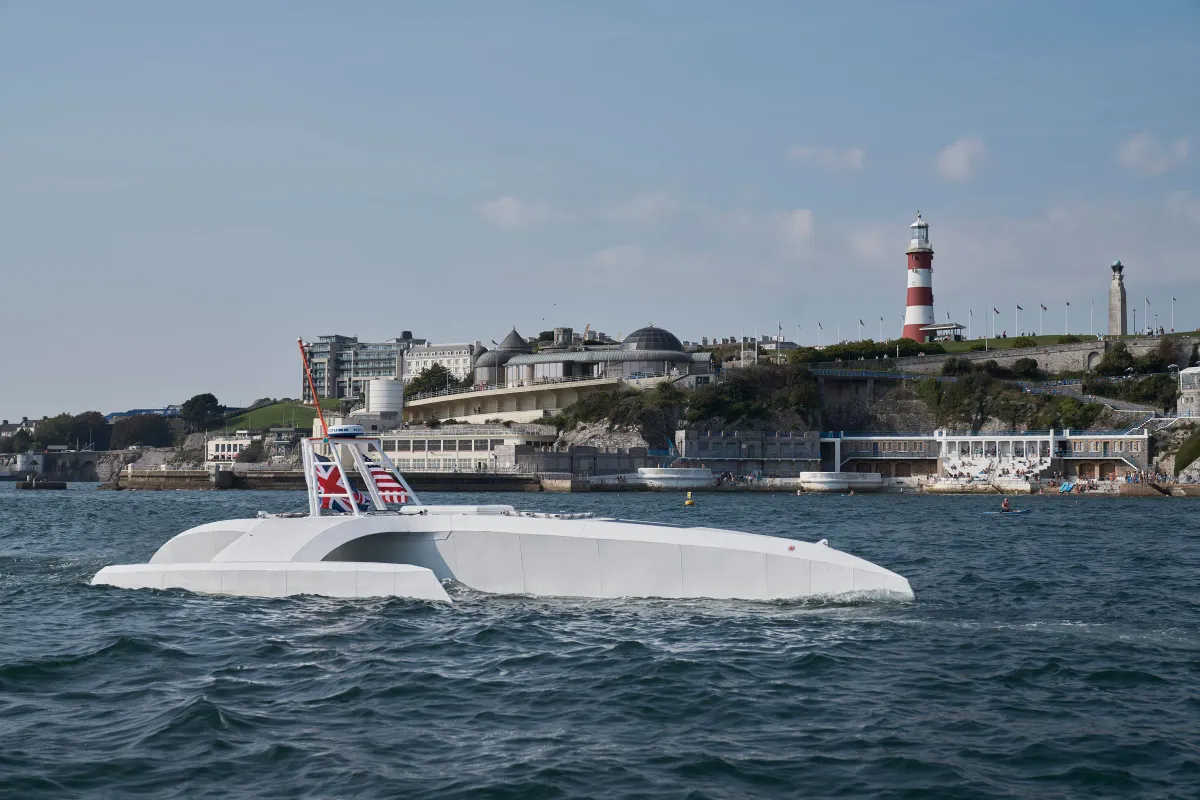Robot Ships Are Coming! This US Startup Is Revolutionizing Naval Power

Autonomous Ships Could Sail Before Flying Cars Take Off: Meet the Startup Making It Happen
A US startup is racing ahead in the tech world—not on land or in the skies, but out at sea. While everyone talks about flying cars, Blue Water Autonomy, a Boston-based company, is bringing robotic ships to life.
Founded in 2024 by a team of experts from the US Navy, Amazon Robotics, and iRobot, Blue Water Autonomy is working on fully autonomous ships that could transform military operations and eventually disrupt the commercial shipping world.
Backed by $14 million in seed funding, the company is not just dreaming—it’s already testing 100-ton vessels off the Boston coast.
Here’s everything you need to know about this game-changing startup and how it plans to bring AI-powered ships into reality.
Who Is Behind Blue Water Autonomy?
Built by Experts in Defense and Robotics
Blue Water Autonomy is not just another tech startup. It was founded by veterans from:
- The United States Navy
- Amazon Robotics
- iRobot (the makers of the Roomba)
This powerful blend of military expertise and robotics innovation gives the company a strong foundation to tackle the complex world of autonomous marine operations.
Founded in 2024, the startup has already:
- Developed a full autonomy tech stack
- Completed early concept designs for its unmanned ships
- Launched open-water tests of a massive 100-ton prototype vessel
$14 Million Boost to Make Robot Ships a Reality
Blue Water Autonomy recently secured $14 million in seed funding to accelerate its vision.
Who’s Investing?
The funding round included big names like:
- Eclipse VC
- Riot Ventures
- Impatient Ventures
These investors are betting on the future of AI-driven naval systems, and the funding will go toward:
- Hiring more engineers and AI specialists
- Scaling testing and prototype development
- Preparing for deployment in real-world missions
This funding shows a strong belief in the dual potential of the technology—for defense and commercial use.
Testing Is Already Underway
First Real-World Trials
Blue Water Autonomy isn’t just talking about the future—it’s already happening.
The company is conducting open-water tests using a 100-ton autonomous test ship off the coast near Boston. These trials are focused on:
- Testing navigation and decision-making AI
- Handling rough sea conditions without human input
- Integrating radar, cameras, and marine sensors
The trials aim to fine-tune the autonomy software to safely operate in high-risk and high-traffic environments like busy ports and open oceans.
Why Autonomous Ships Matter Right Now
Rising Global Tensions Make This Urgent
Autonomous ships aren’t just a cool tech experiment—they could be crucial for national defense.
With rising maritime tensions in places like the Pacific, Black Sea, and Red Sea, there is a growing need for:
- 24/7 surveillance
- Low-risk naval presence
- Cost-effective force multipliers
The US currently lags behind China in shipbuilding. Blue Water Autonomy’s unmanned vessels could help fill the gap by providing:
- Persistent patrols without extra personnel
- Cheaper alternatives to manned warships
- High-tech deterrents in conflict zones
Dual-Use Technology: Defense and Commercial Potential
While defense is the immediate focus, Blue Water Autonomy sees a much bigger opportunity.
Commercial Use Cases in Sight
The startup is developing dual-use systems—technologies that work for military and civilian markets alike.
Potential commercial applications include:
- Cargo shipping: Reduce fuel and crew costs, increase safety
- Offshore energy: Autonomous ships for oil, gas, and wind farm monitoring
- Fishing: Unmanned vessels that can fish and return with minimal human input
- Luxury boats: Self-navigating yachts for the ultra-rich
This flexibility could transform global shipping, much like how self-driving cars are expected to change road travel.
Why This Matters for the US and the World
Blue Water Autonomy’s rise comes at a strategic moment.
Strengthening US Naval Power
As global trade routes like the Red Sea become more volatile, the US needs affordable, scalable ways to maintain presence without overextending its human resources.
Unmanned ships:
- Don’t require large crews
- Can stay at sea for long periods
- Are safer to deploy in dangerous zones
They offer a force-multiplier effect—doing more with less.
Innovation That Inspires
The startup’s journey is also a symbol of American tech innovation, especially at a time when military innovation and AI leadership are becoming global priorities.
By merging defense experience with robotics expertise, Blue Water Autonomy represents the next wave of defense-tech startups—nimble, well-funded, and mission-driven.
What’s Next for Blue Water Autonomy?
With fresh funding and promising trial results, the company plans to:
- Expand its engineering team
- Build more prototype vessels
- Push for wider-scale trials and eventual deployment
The future could include partnerships with:
- US Navy and Coast Guard
- Defense contractors
- Global shipping firms
If successful, Blue Water Autonomy may not only change how we defend our waters, but also how we transport goods, fish, and explore the oceans.
Robot Ships Are Closer Than You Think
While the world waits for flying cars, robot ships are already being tested on open seas.
Blue Water Autonomy is leading a quiet revolution—one that could change everything from military strategy to global trade logistics.
With top-tier talent, deep-pocketed investors, and a clear mission, this Boston startup is proving that the future of maritime autonomy is no longer science fiction—it’s sailing fast toward reality.



